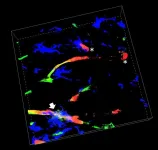(Press-News.org) Particle accelerators hold great potential for semiconductor applications, medical imaging and therapy, and research in materials, energy and medicine. But conventional accelerators require plenty of elbow room — kilometers — making them expensive and limiting their presence to a handful of national labs and universities.
Researchers from The University of Texas at Austin, several national laboratories, European universities and the Texas-based company TAU Systems Inc. have demonstrated a compact particle accelerator less than 20 meters long that produces an electron beam with an energy of 10 billion electron volts (10 GeV). There are only two other accelerators currently operating in the U.S. that can reach such high electron energies, but both are approximately 3 kilometers long.
“We can now reach those energies in 10 centimeters,” said Bjorn “Manuel” Hegelich, associate professor of physics at UT and CEO of TAU Systems, referring to the size of the chamber where the beam was produced. He is the senior author on a recent paper describing their achievement in the journal Matter and Radiation at Extremes.
Hegelich and his team are currently exploring the use of their accelerator, called an advanced wakefield laser accelerator, for a variety of purposes. They hope to use it to test how well space-bound electronics can withstand radiation, to image the 3D internal structures of new semiconductor chip designs, and even to develop novel cancer therapies and advanced medical-imaging techniques.
This kind of accelerator could also be used to drive another device called an X-ray free electron laser, which could take slow-motion movies of processes on the atomic or molecular scale. Examples of such processes include drug interactions with cells, changes inside batteries that might cause them to catch fire, chemical reactions inside solar panels, and viral proteins changing shape when infecting cells.
The concept for wakefield laser accelerators was first described in 1979. An extremely powerful laser strikes helium gas, heats it into a plasma and creates waves that kick electrons from the gas out in a high-energy electron beam. During the past couple of decades, various research groups have developed more powerful versions. Hegelich and his team’s key advance relies on nanoparticles. An auxiliary laser strikes a metal plate inside the gas cell, which injects a stream of metal nanoparticles that boost the energy delivered to electrons from the waves.
The laser is like a boat skimming across a lake, leaving behind a wake, and electrons ride this plasma wave like surfers.
“It’s hard to get into a big wave without getting overpowered, so wake surfers get dragged in by Jet Skis,” Hegelich said. “In our accelerator, the equivalent of Jet Skis are nanoparticles that release electrons at just the right point and just the right time, so they are all sitting there in the wave. We get a lot more electrons into the wave when and where we want them to be, rather than statistically distributed over the whole interaction, and that’s our secret sauce.”
For this experiment, the researchers used one of the world’s most powerful pulsed lasers, the Texas Petawatt Laser, which is housed at UT and fires one ultra-intense pulse of light every hour. A single petawatt laser pulse contains about 1,000 times the installed electrical power in the U.S. but lasts only 150 femtoseconds, less than a billionth as long as a lightning discharge. The team’s long-term goal is to drive their system with a laser they’re currently developing that fits on a tabletop and can fire repeatedly at thousands of times per second, making the whole accelerator far more compact and usable in much wider settings than conventional accelerators.
The study’s co-first authors are Constantin Aniculaesei, corresponding author now at Heinrich Heine University Düsseldorf, Germany; and Thanh Ha, doctoral student at UT and researcher at TAU Systems. Other UT faculty members are professors Todd Ditmire and Michael Downer.
Hegelich and Aniculaesei have submitted a patent application describing the device and method to generate nanoparticles in a gas cell. TAU Systems, spun out of Hegelich’s lab, holds an exclusive license from the University for this foundational patent. As part of the agreement, UT has been issued shares in TAU Systems.
Support for this research was provided by the U.S. Air Force Office of Scientific Research, the U.S. Department of Energy, the U.K. Engineering and Physical Sciences Research Council and the European Union’s Horizon 2020 research and innovation program.
The University of Texas at Austin is committed to transparency and disclosure of all potential conflicts of interest. University investigators involved in this research have submitted required financial disclosure forms with the University.
END
Compact accelerator technology achieves major energy milestone
2023-11-28
ELSE PRESS RELEASES FROM THIS DATE:
Living in a +50°C world: Cooling must be considered critical infrastructure, says new report
2023-11-28
University of Birmingham Press Release
STRICTLY EMBARGOED UNTIL 00.01 Tuesday 28th November UK TIME/ 19.01 Monday 27th November EASTERN TIME
Experts from the University of Birmingham are calling for global cooling and cold chain to be considered as critical infrastructure as the planet continues to heat.
The report, The Hot Reality: Living in a +50°C World, comes as world leaders, businesses, scientists, and environmental agencies gather in Dubai for the start of COP 28.
The Hot Reality: Living in a +50°C World project is led by the Centre for Sustainable Cooling and the Africa Centre of Excellence for Sustainable Cooling ...
Health: Greater adherence to lifestyle recommendations associated with lower cancer risk
2023-11-28
Greater adherence to the World Cancer Research Fund/American Institute for Cancer Research (WCRF/AICR) cancer prevention recommendations — which encourage a healthy lifestyle — is associated with a lower risk of all cancers combined and some individual cancers such as breast cancer. The findings are published in BMC Medicine.
The 2018 WCRF/AICR cancer prevention recommendations aim to reduce the risk of cancer by encouraging individuals to maintain a healthy weight, be physically active, and eat a diet rich in wholegrains, vegetables, fruit, and beans, but low in highly processed foods, red and processed meat, sugar-sweetened drinks, and alcohol.
John Mathers and ...
Unlocking the genetic mysteries: DNA methylation of gene silencers sheds light on disease variation
2023-11-28
[Jerusalem, Israel]
Professor Asaf Hellman and his research team at the Hebrew University-Hadassah Medical School have unveiled new findings in the realm of methylation-directed regulatory networks. Their study sheds light on the mechanisms governing the activation and suppression of mutation-driven disease genes, particularly in cases like glioblastoma, offering insights into variations in disease expression among patients. This research has the potential to revolutionize disease research and clinical applications, paving the way for personalized medicine, diagnostic biomarkers, and improved patient care. Currently, 98% of individuals hospitalized ...
Chapman University researcher, Dr. Rachita Sumbria, plays a key role in groundbreaking study on brain hemorrhages
2023-11-28
A groundbreaking study co-authored by Rachita Sumbria, associate professor in the Chapman University School of Pharmacy, has uncovered a new contributor to the formation of brain hemorrhages. Contrary to previous beliefs that such hemorrhages were solely linked to blood vessel injuries, the research reveals that increased interactions between aged red blood cells and brain capillaries can lead to brain microhemorrhages. This discovery not only enhances new understandings of the mechanisms behind these microhemorrhages but also opens up new possibilities ...
Aussie teens are not actually selfie-obsessed
2023-11-28
A new study zooming in on how smartphones influence our photography habits found Australians aged 20 to 40 years old take more selfies than teenagers and older Australians.
The research, from RMIT University and the Pathshala South Asian Media Institute, studied over 1,200 smartphone photos taken during a two-week period by 30 participants and found older participants overall took more photos than teenage participants.
Research lead and RMIT Senior Lecturer Dr TJ Thomson said older participants often used their smartphone cameras in more functional ways, such as capturing information ...
Your co-worker is sick? Your body is already preparing for a fight
2023-11-28
It’s well-known that when those around us get sick, there’s a good chance we’ll catch what they have, but new research reveals that simply observing a sick individual triggers a biological response.
Patricia Lopes, an assistant professor of biology at Chapman University, is studying how the body anticipates the possibility of infection just by witnessing someone else's symptoms. This phenomenon raises questions about the interconnectedness of individuals within a social group and how the perception of sickness can influence the health and behavior of others.
Her recent work showed that when healthy ...
Culling grey squirrels not necessary for overall biodiversity, expert suggests
2023-11-28
Life on Earth is facing the greatest rate of extinction in history – and humans are the disruptive force, according to a leading ecologist.
Protecting biodiversity, according to consultant ecologist Nigel Dudley who has worked with international organizations including WWF International and UNESCO, does not mean prioritizing animal lives at all costs or focusing narrowly on nature’s economic values.
The author defines biodiversity rights here as ‘the right of all species to continue their natural span of existence within a functioning ecosystem’.
Dudley says the failure of some governments to respect biodiversity ...
No ‘smoking gun’ mental health harm from internet: landmark Oxford survey
2023-11-28
University of Oxford News Release
Oxford Internet Institute
Strict Embargo until 00.01 GMT Tuesday, 28 November 2023
No ‘smoking gun’ mental health harm from internet: landmark Oxford survey
Study of two million individuals’ psychological well-being from 2005 to 2022 in 168 countries, in relation to country-level internet-use and mobile broadband statistics
Negative and positive experiences had increased on average, but little to no evidence suggesting (mobile) internet use was associated with these changes
Links between internet adoption ...
Algorithm appreciation overcomes algorithm aversion
2023-11-28
Advertising content generated by artificial intelligence (AI) is perceived as being of higher quality than content produced by human experts – according to a new research paper in Judgment and Decision Making, a journal published by Cambridge University Press on behalf of the Society for Judgment and Decision Making and the European Association for Decision Making.
In the first study of its kind, the findings challenge the view that knowing a piece of content is generated with AI involvement lowers the perceived quality of content – known as algorithm aversion. ChatGPT4 outperforms human experts in generating advertising content for ...
The University of Oklahoma and Oklahoma State University collaboration finds semaglutide treatment is associated with remarkable reductions in Alcohol Use Disorder symptoms
2023-11-28
The first published evidence from humans that semaglutide specifically reduces the symptoms of Alcohol Use Disorder (AUD) has been published in The Journal of Clinical Psychiatry and details a recent collaboration between clinicians and scientists at the University of Oklahoma School of Community Medicine and Oklahoma State University Center for Health Sciences. The paper outlines the outcomes of six patients who received semaglutide during treatment for weight loss, demonstrating a significant and noteworthy decrease in their Alcohol Use Disorders Identification Test (AUDIT) scores.
The paper is titled "Significant ...





